Constantly in the line of fire
- Category: Reports
- Written by Heike Hänsel
- Published: Monday, 17 September 2012
Threatened suspension of the Solidarity Party of Afghanistan. Islamists oppose freedom of expression

By Heike Hänsel, Spokeswoman on development policy for the Left Party parliamentary group and Chairwoman of the German Bundestag’s Subcommittee on the United Nations, International Organisations and Globalisation
Whilst people across the world mobilised this month in support of the Russian band Pussy Riot, the global public has scant interest in the massive restrictions on freedom of expression in Afghanistan. In May 2012, the Afghan authorities acted to ban a political party for the first time since the beginning of President Hamid Karzai’s term in office. The party concerned is the left-wing Hezb-e-Hambastagi-ye Afghanistan, also known as the Solidarity Party of Afghanistan (SPA), which is an alliance of mainly young people who demonstrate against impunity for war crimes and in favour of the withdrawal of NATO troops.
On 30 April, supporters of Hezb-e-Hambastagi-ye in Kabul staged a demonstration in the context of the celebrations for “Mujahideen Victory Day”. The protesters held up portraits of Taliban and Mujahideen leaders and called for them to be held accountable for the human-rights violations they had committed. They also demanded an end to the “warlord culture” in Afghanistan.
As confirmed by the German Federal Government on 16 August in answer to a question put by the Left Party parliamentary group, some representatives from the Upper House (Meshrano Jirga/Senate) had on 1 May denounced the demonstration as an “insult to the jihad” and demanded that the party be banned. The Senate called on its Complaints Committee to investigate the events concerned. Following the questioning of several SPA representatives, the Complaints Committee decided on 2 June to dismiss the complaints. Irrespective of the investigations of the Complaints Commission, the Senate’s Commission on Legislative Affairs and Justice on 26 May called on the Justice Ministry and the Attorney-General’s Office to suspend the party’s registration. Pursuant to the law on political parties in the Islamic Republic of Afghanistan, only the department for the registration of political parties at the Justice Ministry is entitled to issue a suspension or ban of a political party.
In the meantime, even the party leadership assumes that the investigations of the Attorney-General’s Office have been ceased – not least due to pressure from the international community, including Human Rights Watch and Afghan civil society. It is basing this assumption on comments made by the Afghan government. The party can thus continue its activities. Yet the threat is far from banished. Members of the party continue to face attempts to intimidate them, including in some cases death threats.
This is not the first time that freedom of expression has been restricted in Afghanistan. In 2003, the newspaper Aftab was banned. And, five years ago, the Afghan member of parliament and human-rights activist Malalai Joya was suspended due to her repeated protests in Parliament against the violence of warlords and war criminals. Since then, she has constantly been at risk of attacks, has been forced into hiding and has survived six attempts on her life.
The downfall of the Solidarity Party also recalls the case of the Kambaksh brothers, whose persecution attracted attention worldwide. Sayed Yaqub Ibrahim is a critical journalist who works for the IWPR (Institute for War and Peace Reporting) and has made himself a major enemy of the warlords through his reporting on war crimes, corruption and human-rights violations. His brother, the student Sayed Pervez Kambaksh, was arrested in 2007 and sentenced to death by an Islamic court for downloading a text critical of Islam which had been posted on the Internet. In reality, however, it was his brother, with his reporting on the warlord system, who was the true target of the Islamists’ anger expressed in the sentence he received. Following international protests and articles, including in Der Spiegel magazine, the sentence against Sayed Pervez Kambaksh was initially commuted to life imprisonment. In September 2009, he was released and he and his brother have both since lived in exile.
The Left Party has received both the women’s rights activist Malalai Joya and Sayed Yaqub Ibrahim as guests in Berlin, most recently in 2011, during its Afghanistan conference. For the first time in the history of Afghanistan, around a dozen critical organisations and peaceful civil-society activists met to talk about the situation and the future of the country. The Solidarity Party also sent a representative to Berlin, who gave a dramatic account of demonstrations in Afghanistan and the enormous support which the party enjoys, including in rural areas, with around 30,000 members. The international public hears almost nothing of these protests.
The most recent case concerning the Solidarity Party demonstrates that the progressive left-wing forces in Afghanistan are taking a great risk. At this moment in time they especially need international attention and strong solidarity from civil society!
This is translation of an article published on German paper Junge Welt on Aug.30, 2012










